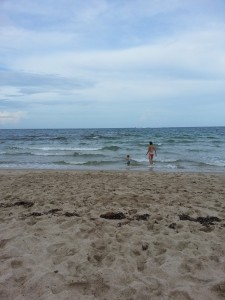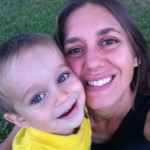 I stand in the ocean. The water is warm, placid, and crystal clear. Little translucent fish swim around my legs. I hold my 22-month old son Taber in my arms. He rests his head on my shoulder.
I stand in the ocean. The water is warm, placid, and crystal clear. Little translucent fish swim around my legs. I hold my 22-month old son Taber in my arms. He rests his head on my shoulder.
My husband puts his goggles on to check out a nearby Needlefish. It’s our family morning time at the beach. Having recently moved to south Florida, we are amazed by the world-renowned beauty found a mile away from our doorstep.
My son pulls my blue swimsuit to the side and begins to nurse. I stand tall, gaze at the surrounding beauty, and breathe in the powerful peace moving through my soul. I etch this tender mercy into my heart’s collection of memories. This moment is so primal, so right, and so beautiful.
I stand in the ocean’s magical waters and breastfeed under the sun.
“Maybe six months,” I once told my husband. Newly pregnant, I tried to imagine how long I’d want to breastfeed. “Maybe six months and of course, I’m not opposed to using formula at night. I’ve heard it helps babies sleep longer.”
I had no idea what I was talking about.
At the time, I worked at a demanding and fulfilling job— teaching comparative religion and philosophy at a competitive boarding school in New Jersey. Sleep was a high priority for my newly pregnant self, especially while balancing my academic workload with part-time birth doula work. I considered myself educated about birth. However, my understanding of breastfeeding was minimal. While I could help new moms with an initial latch, I considered breastfeeding the specialty of postpartum doulas. I read about breastfeeding for my birth doula requirements without retaining the information thoughtfully.
I knew breastfeeding was healthier than formula but I didn’t know how significantly. I didn’t know supplementing with formula diminishes a mother’s natural milk supply. My reading about the nefarious history of formula companies came later. At the time, I simply feared breastfeeding would infringe on precious sleep. I imagined it to be another task to add to the “mother-to-do list.”
It even considered forgoing breastfeeding all together. Concerned, my husband reminded me of the vital benefits to mother and child.
“OK, at least six months,” I said.
I didn’t realize that something so much more important than any item on a to-do list would soon transform my heart. I hadn’t considered how co-sleeping would make nighttime nursing one of the sweetest and most spiritual experiences of my life. Truly nothing prepared me for the biological beauty of nourishing my son with milk made in my body. From the moment my newborn rested in my arms, I was transformed. Like a newly emerged butterfly, I could only shake my head in wonder at the earlier perspective of my ignorant, caterpillar self.
Forever grateful for the support of my husband and a skilled lactation consultant, I made it through the first week of finding the right latch.
“Don’t give up Amy,” my husband said. During those early days postpartum, I curled my toes and cried when Taber began to nurse. “We’ll find the help you need. One day soon, you’ll love breastfeeding.”
He was so right.
During the first year of breastfeeding, I read all I could about the subject. I spent many hours reflecting upon the painful chasm between our cultural attitudes about breasts/attachment and nature’s wisdom. I read about brain development, vital touch, child-led weaning, and the symbiotic relationship between a nursing mother and child. I learned that the limbic brain, the seat of empathy, is nourished through breastfeeding. This part of the brain is unique to mammals and its healthy development is of utmost importance in our contemporary society. I learned about the natural ages of weaning across human cultures and shuddered with shame at the harsh judgments I once made about mothers who nursed toddlers.
In short, I had a complete paradigm shift.
Today, my 22-month-old son calls my breasts “nummies.” I do my best to teach him to ask with patience and kindness when he wants them. I’ve cried tender tears watching Taber fall asleep in my arms with his tummy full of the most nourishing food known to humankind. We continue to co-sleep and he nurses into, and out of, dreamland. Breastfeeding is a vital nutritional and emotional touchstone for his developing self. I feel honored and humbled to meet his needs with love.
Taber likes to share “his” nummies. While settling down for a nap, Taber takes a few moments to offer milk to a stuffed animal nearby. If we are in the bath, he likes the yellow ducky to have some too. When my husband comes home from a long day at work, he’s often invited to the breast.
“Partake, hard working father! This stuff is great!” says the wide expression of joy on our little one’s face. My husband and I laugh.
Once, Taber picked up a small statue of Buddha and made sure the enlightened one had his daily dose of breast milk.
“I’m nursing a Buddha,” I thought to myself. I looked down at my son and knew that it was true.
I fully believe my son has a right to nurse until he is ready to stop. Unless, this process causes me pain or harm, I pray I have the health, courage, and strength to offer nourishing milk and defend Taber’s right to self-wean. While I’ve faced heartbreaking opposition to nursing beyond the age of one, I bow in gratitude to the many dear friends and family members who support breastfeeding into the toddler years.
My sister Rachel, in particular, stands by my side. She gave into pressure from her ex-husband to wean her daughter much earlier than her daughter’s needs and temperament required. It was a very difficult weaning for my little niece. This experience haunts my sister. As Rachel told her story, I vowed not to experience the same regret.
Buddhism teaches that desire causes suffering. The Sanskrit word “tanha” is often translated as desire or attachment. But in my studies, the term “clinging” reflects the wisdom of Buddhism best. When we cling to changing things wishing they didn’t change, we suffer. Taber and I share a healthy attachment and this shouldn’t be confused with clinging. Indeed, a secure attachment base is necessary in order to both receive, and release, life’s gifts with emotional health. When Taber is ready to wean, I will cry the normal tears of letting go and I will release the breastfeeding chapter of my life with profound gratitude. Just as one ocean wave merges into another, he and I will move into the next stage of our relationship with a graceful flow and, I pray, no regrets.
I stand in the sunlight. Taber releases my nipple and looks up smiling. He sees his father nearby and reaches for him. Father and son time commences. My husband lifts Taber up to the sky. Their bond is beautiful.
“My Dada!” Taber shouts with joy.
A new wave comes and washes around my legs. May I bow to the beauty that brings this moment into being and also to an end. For all things that begin, end.
For now, ocean water, breastfeeding reflections, and joy fill my senses.
 Amy Wright Glenn earned her MA in Religion and Education from Teachers College, Columbia University. She taught in The Religion and Philosophy Department at The Lawrenceville School in New Jersey for over a decade. While at Lawrenceville, Amy was the recipient of the Dunbar Abston Jr. Chair for Teaching Excellence. She is a Kripalu Yoga teacher, a DONA certified birth doula, and a hospital chaplain. Her work has appeared in International Doula. She recently published her first book: Birth, Breath, and Death: Meditations on Motherhood, Chaplaincy, and Life as a Doula. She is a 40-year-old mom. Amy loves being able to stay-at-home and nurture her 20-month-old son.
Amy Wright Glenn earned her MA in Religion and Education from Teachers College, Columbia University. She taught in The Religion and Philosophy Department at The Lawrenceville School in New Jersey for over a decade. While at Lawrenceville, Amy was the recipient of the Dunbar Abston Jr. Chair for Teaching Excellence. She is a Kripalu Yoga teacher, a DONA certified birth doula, and a hospital chaplain. Her work has appeared in International Doula. She recently published her first book: Birth, Breath, and Death: Meditations on Motherhood, Chaplaincy, and Life as a Doula. She is a 40-year-old mom. Amy loves being able to stay-at-home and nurture her 20-month-old son.
This article first appeared in Holistic Parenting magazine, Issue 2 (March/April 2014)
http://HolisticParentingMagazine.com
